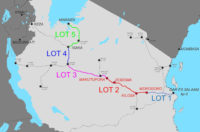Tanzania has awarded Jacobsen Elektro AS, a Norwegian power engineering firm, a $124.8 million contract to supply and install power generation equipment for a 100MW power plant in the capital Dar es Salaam.
The project, funded by Tanzania and Norway, is considered crucial in attempts at easing chronic outages around the capital and for ongoing efforts to integrate regional electricity generation. It also shows how Norway is increasing its presence in Tanzania's energy sector, despite intensifying pressure from Chinese firms.
The project is also a keystone in regional electricity integration plans, particularly the Kenya-Tanzania-Zambia interconnection that involves the installation of a 250-kilometer line of 220kV and a 670-kilometer line of 330kV. Feasibility studies for this interconnection are complete.
The power plant at Ubungo, which is within the capital Dar es Salaam, will consist of GE LM6000 and GT10B gas turbine generators that can run on natural gas, much of it to be supplied the Songo Songo Island in the country's Lindi region.
A second 60-MW power plant that will use heavy fuel will also be constructed concurrently at Nyakato in Mwanza, although the country's state-run power utlity, Tanzania Electric Supply Company Limited (TANESCO), could not confirm the contractor for the $354-million project. Both the Ubungo and Mwanza project should be completed by June 2012, according to Tanesco's project coordinator Simon Jilima.
On completion, the energy project is expected to bridge Tanzania's 264MW power deficit, and provide a shot in the arm to efforts by the East African Power Pool, an initiative for pooling energy resources and promoting power exchanges between utilities in 10 countries that include Egypt, Sudan, Djibouti , Ethiopia, Kenya, Uganda, Rwanda, Burundi, Democratic Republic of Congo (DRC) and Tanzania.
Norway is also associated with several energy projects in the east African nation, including the Pangani Falls Redevelopment Project, Kihansi hydro-power plant and the Rufiji Basin Master Plan, which involves several dam projects.
The increasing role of Norway and Norwegian firms in Tanzania's infrastructure sector comes at a time when China is pushing for an increased share of construction projects in the country.



Post a comment to this article
Report Abusive Comment